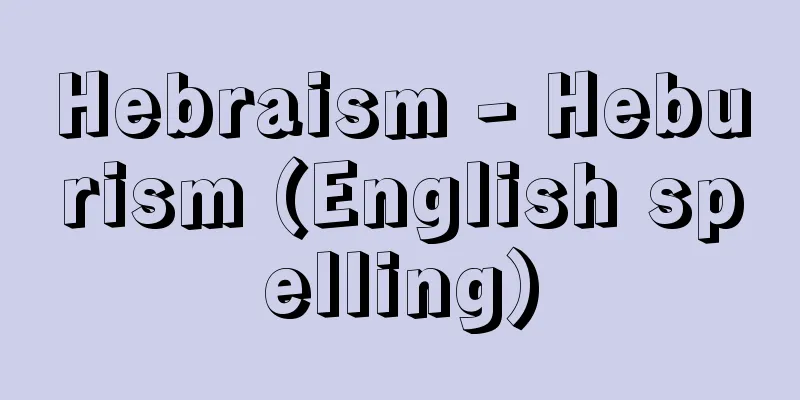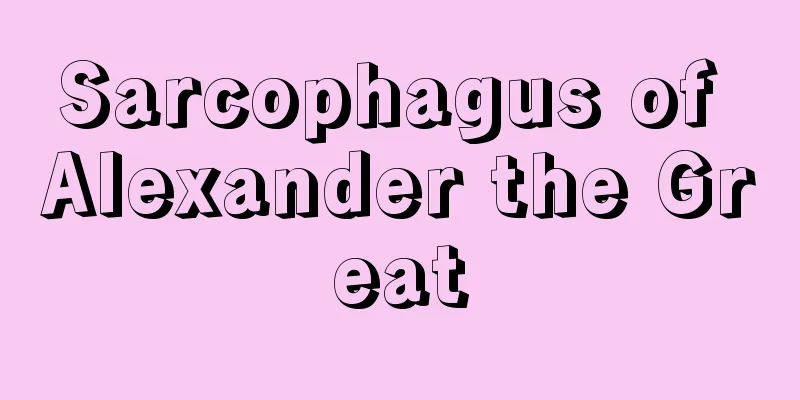Hebraism - Heburism (English spelling)

|
In the narrow sense, it means Hebrew grammar, but in the broad sense, it refers to the whole of Hebrew thought, culture, life, and tradition, or its characteristics, which are fundamentally determined and characterized by the Hebrew religion (the Old Testament). In particular, as a concept of spiritual history, it is often typologically contrasted with Hellenism as the Greek spirit. In this case, it is a general term for Hebrew-Christian things that include primitive Christianity and even Christian tradition in general. This contrast has been known for a long time, but it became generally known after the English poet and critic M. Arnold, in his book Culture and Disorder, cited them as two motives that have historically shaped and driven Europe. According to him, while the dominant idea of Hellenism is the spontaneous working of consciousness, the dominant idea of Hebraism is the strictness and obedience of conscience. [Wataru Mizugaki] ThoughtHebraism, characterized by such religious and ethical attitudes, was formed by the ancient Israelites' belief in the one God, Yahweh, which developed through historical experience and reached its climax in the prophets. Therefore, Hebraism is sometimes represented by the prophetic spirit, Prophetismus. The characteristics of Hebraism compared to Hellenism are generally said to be the idealism, rationalism, and objectivism of the former, and the realism of God's creation that rejects the dualism of mind, body, and matter, the view of history that seeks to grasp history and its meaning as a one-time process between creation and the end of time, and so on, in contrast to the realism, irrationalism, voluntarism, personalism, and the dualism of mind and body/matter of the latter. However, it is a difficult task to academically justify such a general view and to investigate the historical interaction between Hebraism and Hellenism with it. As one such attempt, the proposal of "hajathologia" based on the Hebrew word "hāyāh" indicating the existence and activity of God in contrast to Greek ontology (Tetsutaro Ariga) is important. [Wataru Mizugaki] "Thoughts of the Hebrews and Greeks" by Thoreif Bormann, translated by Shigeo Ueda (1970, Shinkyo Publishing) " "Problems of Ontology in Christian Thought" (included in "Collected Works of Tetsutaro Ariga, Volume 4", 1981, Sobunsha) [References] |Source: Shogakukan Encyclopedia Nipponica About Encyclopedia Nipponica Information | Legend |
|
狭義ではヘブライ語法を意味するが、広義ではヘブライ宗教(旧約聖書)によって根本的に規定され特徴づけられたヘブライ思想、文化、生活および伝統の全体、あるいはその特質をさす。とくに精神史的な概念としては、ギリシア精神としてのヘレニズムと類型的に対比されることが多い。この場合には原始キリスト教、さらにはキリスト教的伝統一般を包括するヘブライ的キリスト教的なものの総称である。このような対比は古くから知られていたが、イギリスの詩人で批評家のM・アーノルドが、『教養と無秩序』において、ヨーロッパを歴史的に形成し動かしている二つの動機としてあげてから、一般に有名になった。彼によれば、意識の自発的な働きが支配的観念であるヘレニズムに対して、ヘブライズムの支配的観念は良心の峻厳(しゅんげん)と服従である。 [水垣 渉] 思想このような宗教的、倫理的態度に特徴をもつヘブライズムは、古代イスラエル民族の唯一神ヤーウェに対する信仰が歴史的な経験を通して展開されることによって形成され、預言者においてその頂点に達したものである。したがってヘブライズムは預言者的精神Prophetismusで代表されることがある。 ヘレニズムに対するヘブライズムの特徴として一般にあげられるのは、前者の観念論、合理主義、客観主義などに対して、後者の実在論、非合理主義、主意主義、人格主義、精神と肉体・物質との二元論を排する神の創造による現実主義、歴史とその意味とを創造と終末との間の一回的過程において把握しようとする歴史観などである。しかしこのような一般的見解を学問的に根拠づけ、それでヘブライズムとヘレニズムとの歴史的交渉を究明することは困難な課題に属する。そのような試みの一つとして、ギリシア的存在論に対して、神の存在・働きを示すヘブライ語「ハーヤー」hāyāhに基づく「ハヤトロギア」hajathologiaの提唱(有賀鐵太郎)は重要である。 [水垣 渉] 『トーレイフ・ボーマン著、植田重雄訳『ヘブライ人とギリシア人の思惟』(1970・新教出版社)』▽『『キリスト教思想における存在論の諸問題』(『有賀鐵太郎著作集 第四巻』所収・1981・創文社)』 [参照項目] |出典 小学館 日本大百科全書(ニッポニカ)日本大百科全書(ニッポニカ)について 情報 | 凡例 |
Recommend
Brǎtianu (English spelling)
1864‐1927 Romanian politician. Born into one of Ro...
Deformed dislocation - deformed dislocation
...Therefore, the way in which a baby's diape...
Miladinov, D.
...Yugoslav poet. Born in Macedonia. After studyi...
Princess Sarara of Uno
... means that when the emperor is not in power, ...
Okuninushi-no-Kami
One of the main gods in Japanese mythology. The pr...
Panicum
...The Japanese bamboo grass is generally small a...
Kokawadera Temple
This temple is located in Kokawa, Kinokawa City, ...
Baritone (English spelling)
A musical term. It has three uses: (1) A male voi...
Ethnoscience
A knowledge system based on the unique views of na...
Molar - Molar
The teeth located at the rear of the upper and lo...
Viverridae
…General term for a mammalian species belonging t...
Ganzhou Hui-Hu - Kanshu Kaikōtsu
In 840, the nomadic Uighur state collapsed due to...
Trebenište (English spelling)
…A small clay statue with exaggerated eyes and no...
Unkoin Temple
⇒ Acha no Tsubone Source: Kodansha Digital Japanes...
al-Ḥakam II (English spelling)
... The culture of the Later Umayyad Dynasty was ...









